I came up with the concept for this post moments before I saw the following tweet:
The woman/gay person version of this is thinking you could probably join a cult and then just kinda leave whenever https://t.co/blFc5VCVg6
— zou bisou bisou where are you (@lilgrapefruits) December 14, 2023
As an author who came of relevance on the tide of dark academia (not the actual subgenre, which I am not responsible for because I am profoundly not Donna Tartt, but the rise of bookish social media sublimating a collectively imagined, Pinterestable aesthetic) I am widely known/criticized for my devotion to vibes. Guilty, Your Honor! I can’t explain why the above tweet is absolutely without question correct, but the vibes are there, and unto vibes we shall return.
My best guess is that it speaks to something that lives in the feminine/queer/non-patriarchally-conforming imagination: the unwavering belief in the powers of prolonged introspection, and the sleek, singular intellectualism (were we not all “a pleasure to have in the classroom”?) that will somehow supersede the late-blooming sense of self. There is an incredible potency to the cult (or cult-adjacent) narrative where acceptance by the elite, even if it is tokenized—especially if it is tokenized—is both desirable and worth pursuing, even in the face of taunting, unsubtle danger. For those of us who’ve built our coping mechanisms on the richness of our imaginations and the potent desire for escape—the finish line of achievement, which surely any moment we will reach!—to fuck around is never to actually find out, which is only for the basic bitches, the less devastatingly punk.
Jokes aside, don’t all humans share a collective desire, an atavistic call, a longing for the safety that acceptance brings? And acceptance by the powerful, even if that acceptance is a mirage and merely another form of exploitation, is a glittering, irresistible thing.
It’s true what you’ve heard, that the Atlas series is about hot people doing unconscionable things. Horny jail for me, Your Honor! But that’s just the icing, if you will; the spoonful of pulp within which to hide the medicine. Because the Atlas series is also about power, and who actually holds power, and what power actually means. Its impetus is inseverable from matters of decolonization, radicalization from an infrastructure of corruption, the paradox of ethical existence under conditions of systemic greed. The six Alexandrian candidates are asked to do something horrific for access to absolute power, but the tagline my editor wouldn’t let me put on the cover is that power is a body count.
While gray morality may be contemporarily regarded as a trend, a truly good story lives not in the vibes, but in the far more human question of what a person is willing to sacrifice—and what the compromising of their humanity will cost. All of the following books reckon with that question, and they each follow the tightening, irresistible maelstrom of the human psyche when it comes to facing which of a person’s principles they are willing to betray.
(A tangent: While the conceit of the unreliable narrator has earned a great deal of hype in recent years, I don’t technically believe in a narrator who doesn’t lie to themselves or others. Bear this in mind about my books. Also, the first lie I told you was that this was a list of five books—there are actually six. I’m hoping Tor.com doesn’t notice. I’m relying here on a blind, anecdotal faith that book people only begrudgingly math.)
Catherine House by Elisabeth Thomas
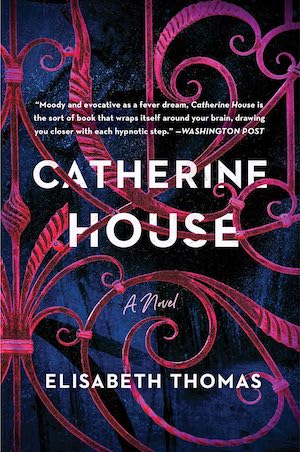
Catherine House, a rural liberal arts school that produces laureates and houses a confidential research program that is probably totally fine, is the one-two punch of Blackbeardian sub-obsession within the prestige school variety of cult. This is one of my favorite books of all time, because I am a devotee of voice above plot and world and genre and basically anything. I will follow any narrator if I’m hooked by their voice, so keep that in mind as to this list and any potential criminal proceedings. Ines, the narrator of this book, is an incredibly strange person, and the mounting question of “Why was this absolute weirdo considered worthy of prestige?” is both enthralling and delicious, particularly when the circumstances of her invitation become known. It’s a dreamlike tale of agency, where the ultimate prize is yourself.
Vita Nostra by Marina and Sergey Dyachenko
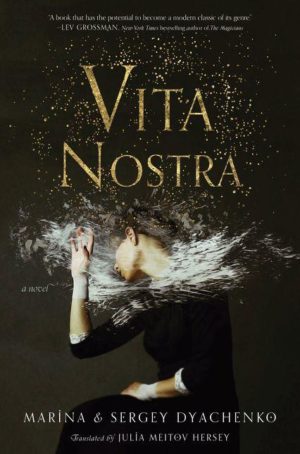
Vita Nostra proves that being recruited by a strange man to a mysterious, isolated academy for magic doesn’t always go down like butterbeer. This book is a fever dream, actively nauseating with its crescendoing surreality, and to Sasha’s credit, she is less invited to join the Institute of Special Technologies cult (okay sure, “school”) than she is forced. Still, Sasha’s ongoing pursuit of her own inherent value and worthiness of companionship and/or achievement means that despite the complicated academic system and the beautiful, empathetic things the series as a whole has to say about life, it predominantly feels like when you’re studying to set the curve or die trying.
Natural Beauty by Ling Ling Huang
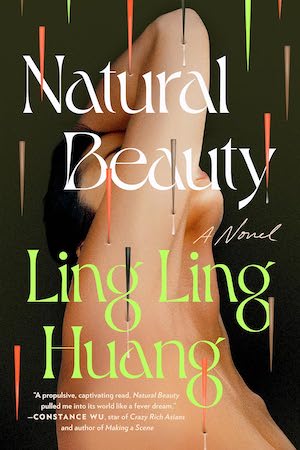
This book, not unlike Catherine House, understands the debilitating power of loneliness, and in this case, ostracization. Not to undress my inner child here, in front of you, my new friends, but how many of us have intuited the message that we didn’t belong, perhaps as marginalized people, or as girls, or as neurodivergent oddballs, or as first gen kids? This is exactly what makes us susceptible to the call of The Cult! In this case, cult recruitment for the wellness company Holistik comes in the form of a much-needed job offer, a socioeconomic matter that speaks to the narrator’s immigrant upbringing and poverty (hello NYC rental market). The things this book has to say about beauty as power (or is it?) fit propulsively into its bittersweet cyclone of inevitable doom.
Little Eve by Catriona Ward
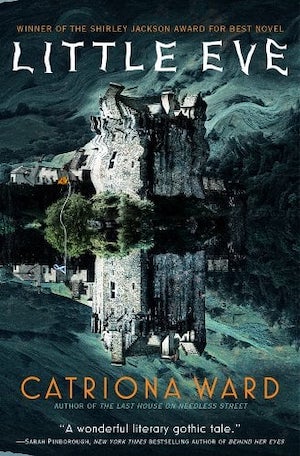
If there’s one thing Catriona Ward understands (aside from how to make me join HER cult), it’s the power of a remote setting. Here, the nature of the cult is very explicit: every member of narrator Evelyn’s “family” of foundlings lives cloistered on the wind-battered Scottish island of Altnaharra and worships an entity known as The Adder, whom only the patriarch Uncle can command. Eve’s transition from total buy-in to the power of the (oc)cult to reaching the precipice of losing everything she loves is gorgeous, ethereal, and masterfully built on the empathetic, deeply felt horror Catriona Ward is the master of.
The Centre by Ayesha Manazar Siddiqi

Translation as an art form is excellent material for otherworldly texture, if not actual magic (see also: Babel by RF Kuang, Intimacies by Katie Kitamura), and Siddiqi’s approach to the world of a secretive, vaguely sinister language facility is outstandingly human, told to us by a narrator who is shaping her own story with self-edits or outright lies. Sure, there’s something obviously creepy about the Centre, where you become fluent in the foreign language of your choice after only ten days by trusting the process and not asking any questions about the program or any of the physical examinations that precede it, but hey, who can say whether that’s sinister or just eccentric. Every choice Anisa makes is a terrible one, and yet you cannot help but say you know what girl, maybe this time it’ll be fine!
Some Desperate Glory by Emily Tesh
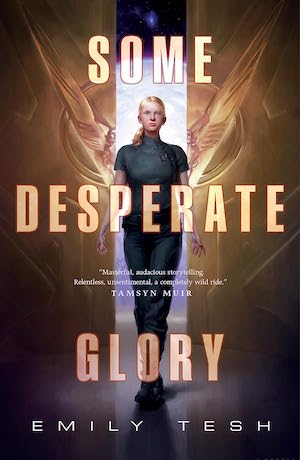
Ha! A Tordotcom title! Try and edit me now, Tor.com! Gaea Station is another very culty cult, a military space brigade seeking revenge for humanity’s destruction (or is it?) and this narrator doesn’t choose the cult, but is born in and makes her way out. My favorite thing about this book aside from Emily Tesh’s signature style (breathtaking! emotionally sweeping! unforgettable!) is Kyr, the dumbest girl in school, whom I spent most of the book willing to die for. Kyr begins the book already making the worst decisions from a broad spectrum of near-comical delusions, and following the process of her radicalization is just as fun (and impossibly more moving) than you can imagine.
Buy the Book


The Atlas Complex
Olivie Blake is the New York Times bestselling author of The Atlas Six, Alone with You in the Ether, One for My Enemy, and Masters of Death. As Alexene Farol Follmuth, she is also the author of the young adult rom-coms My Mechanical Romance and Twelfth Knight. She lives in Los Angeles with her husband, goblin prince/toddler, and rescue pit bull.












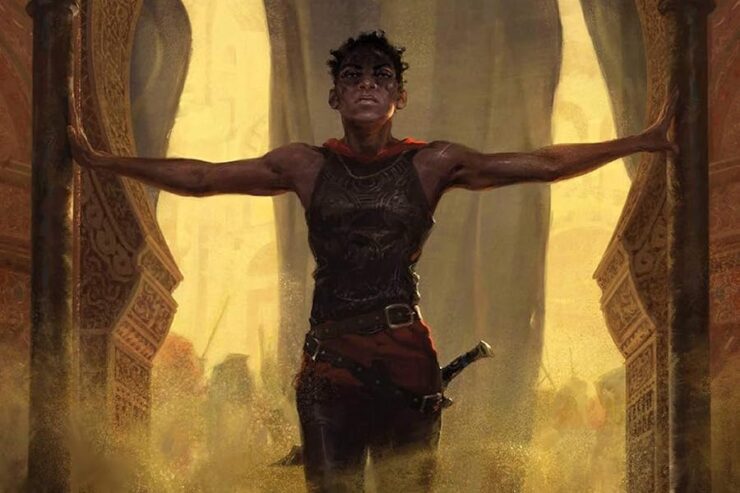


In That Hideous Strength by C.S. Lewis, one of the viewpoint characters thinks he’s lucked into finding “his people” (meaning fellow super-rational, socially conscious yet aloof persons) at his workplace. His employers, having seen his type many times before, tentatively conclude that he is one of “their people” (gullible, a follower, ignorant of his own ignorance, and ripe to be led into the trap of doing so many things his conscience flinches at that he kills it in self defense). So they attempt to induct him into the cult. At this point he experiences what may be the first real moment of self-examination in his life and realizes that he never got over his big sister having a friend who wasn’t him and sharing secrets with her that he didn’t get to know–and his choice of career was shaped by that unexamined anger and the desire to avoid thinking about it. So he tells the weird cult people who appear to be running his division that he isn’t going to do their weird induction ceremony no matter what.
He only finds out later that he barely missed being enslaved, body and soul, to literal, actual Satan.
This one dates back to 1940:
“If this goes on …”
On British Television, the last – in both senses of the word, unfortunately – “Quatermass” serial involved a worldwide cult, known as the “Planet People”, whose followers believed that the Earth was doomed (for which there was some evidence) , but that, by gathering at certain pre-ordained locations, they would be taken out of this world to a better one.
As it turned out, it was in fact the Planet People who were doomed – “I think the Human Race is being harvested!”
Not a book, but a TV series. In the last – in both senses of the word, regretfully – “Quatermass” serial, civilization is on the verge of collapse, and millions of young people, rejecting science and rational thought, have joined a world-wide cult known as “The Planet People”, whose followers believe that the Earth is doomed, but that, by gathering in large numbers at pre-ordained locations, they will be mystically transported to another, better, world – a belief which turns out to be substantially un error – “I think that the human race is bein harvested!”
Totally agree